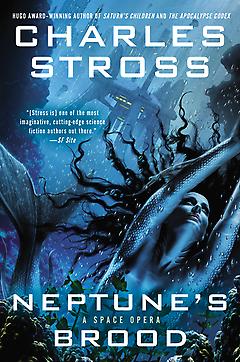Charles Stross is a mainstay on genre award ballots every year; 2014 marks his seventh appearance on the short list for the Hugo Award for Best Novel. There’s good reason for these accolades because when it comes to plausible and well-thought out future scenarios, few can invent better scenarios than Stross.
Neptune’s Brood, in this case, imagines a post-human, far future where we as humanity have become a thing of the past often referred to as Fragiles. The novel is many things, but a primary thrust revolves around economics in the future and a supposed defrauding scam as it features Krina Alizond-118 on her journeys through the galaxy.
Neptune’s Brood is a sequel to Stross’s 2006 novel Saturn’s Children (also nominated for a Hugo), set thousands of years into the future beyond that novel (itself already far into humanity’s future). Stross takes the post-human universe he created in the previous novel and builds a framework for the economics of the milieu while telling a story that has much in common with a mystery/thriller while also focusing on the notion of identity of the individual. Heady stuff, no?
The novel focuses through first-person narration on Krina Alizond-118 as she searches for her missing “sister” Ana Graulle-90 (which in this sense indicates they are cloned from the same being). Krina, with her deep knowledge of the history of accounting and banking, manages to get passage on a space vessel after being convinced to offer her services as a banker. It isn’t long before Krina becomes involved with interstellar pirate bankers, and eventually receives body modification to become a mermaid on the water world of Shin-Tethys in order to search for Ana. On top of all of that, Krina tells us, she has a stalker and discovers what amounts to a 2,000-year old money laundering scam which hinges on an object which might be in the possession of her sister. So yeah, lots of stuff going on here.
However, I didn’t fully connect with a lot of the story. There were multiple info-dumps throughout, many of which begin with Krina stating that she was going to tell us a story. In one such instance Krina even says “I am now going to bore you to death with the political economy of Shin-Tethys.” I realize there’s a heavy dose of snark in that statement, but it it still bothers me that a character would tell us she is going to bore us to death—it’s almost an invitation to skip ahead. A lot of the info-dumps relay the minutia of the future banking system (slow, medium, and fast money) and how Krina is able to circumvent the system as well as the two-thousand year old FTL-scam which brings Krina more focused on finding her sister. While the concept is quite intriguing, at times I felt lectured at, like I was reading an academic piece rather than a work of fiction. In the end, I can see why the novel would work for so many people, while realizing it didn’t fully work for me. But this is only half the discussion since…
In terms of its worthiness and chances on winning the Hugo Award for best novel, Neptune’s Brood does indeed seem like the type of novel that should be at least short-listed. It takes a rather unexplored concept—economics—and couches the discussion of that concept in a (relatively) familiar far-future setting, including elements of the post-human and adventure narratives. In other words, Stross strikes a good balance between experimentation with a new approach and a grounding in familiar territory.
So where does this rank against the other Hugo nominees? Although Neptune’s Brood has received its share of deserved praise, I’m not sure this is Charlie’s year. On the other hand, this convention is practically in the British author’s own backyard, so there may be some local support building to push Neptune’s Brood to the top.
Rob Bedford lives in NJ with his wife and dog. He reviews books and moderates forums at SFFWorld, has a blog about stuff, and writes for SF Signal. If you want to read random thoughts about books, TV, his dog, and beer you can follow him on Twitter: @RobHBedford.










